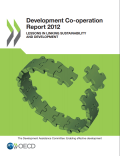This report provides an update on recent developments in the field of Regional Trade Agreements and the environment. Issues arising in the implementation of RTAs with environmental considerations are examined as well as experience in assessing their environmental impacts. It is the fourth update prepared under the aegis of the Joint Working Party on Trade and Environment. The report covers developments over the period from late 2009 to December 2010 and is based on publicly available information.
This UNCTAD publication covers policy responses to meeting the challenge of climate change and the changes to the economic system that need to take place in order to do so. The report asserts that the greatest challenge to mitigating climate change is not the macroeconomic costs, but the lack of policy, regulatory and institutional structures to support the shift to a more sustainable economy that combines low‐carbon growth with job and income creation in developing countries.
The report presents three overarching ‘growth poles’ that can provide opportunities for low‐carbon economic growth and place the global economy on a path to more sustainable development. These growth poles are:
• Energy efficiency
• Sustainable agriculture
• Renewable energy technologies
Each pole is explored in great detail and policy options for the identified initiatives are discussed. The report includes an energy efficiency case study from Brazil.

The Development Co-operation Report is the key annual reference document for statistics and analysis on trends in international aid. The Development Co-operation Report 2012 seeks to provide insights into how to address today’s sustainable development challenges, with a focus on inclusiveness and good governance to ensure that the world's finite resources are equitably distributed, now and in the future. Sharing finite resources among a growing number people – and consumers – is a critical challenge. It is in this spirit that J. Brian Atwood, Chair of the OECD Development Assistance Committee (DAC), invited several intellectual leaders on the challenges of inclusive, sustainable development to contribute to this year’s report.
Half of the world’s population — 3 billion people — lives below the poverty line, and Asia has the largest share. In pursuit of sustainable economic development and poverty alleviation, there is great potential among low-income households for green consumption, production, innovation, and entrepreneurial activity. This paper shows how an inclusive green growth model can uplift the poor through entrepreneurship and fiscal policy reforms. To make the case, this paper cites examples of institutions and policies in Asia that have successfully generated and tapped into the potentials of low-income households. Low-income households are recognised as resilient, value-conscious consumers and creative entrepreneurs in the inclusive and green growth paradigm. Low-income households can be the engine of a new development strategy; they can be a source of innovation for providing basic services in a green way. Evidence suggests that, without effective financial systems, not all market actors can sustain their businesses.
The need to reform water policies is as urgent as ever. Water is essential for economic growth, human health, and the environment. Yet governments around the world face significant challenges in managing their water resources effectively. The problems are multiple and complex: billions of people are still without access to safe water and adequate sanitation; competition for water is increasing among the different uses and users; and major investment is required to maintain and improve water infrastructure in OECD and non-OECD countries. Despite progress on many fronts, governments around the world are still confronted with the need to reform their existing water policies in order to meet current objectives and future challenges. Building on the water challenges identified by the OECD Environment Outlook to 2050, this report examines three fundamental areas that need to be addressed whatever reform agendas are pursued by governments: financing of the water sector; the governance and institutional arrangements that are in place; and coherence between water policies and policies in place in other sectors of the economy.
